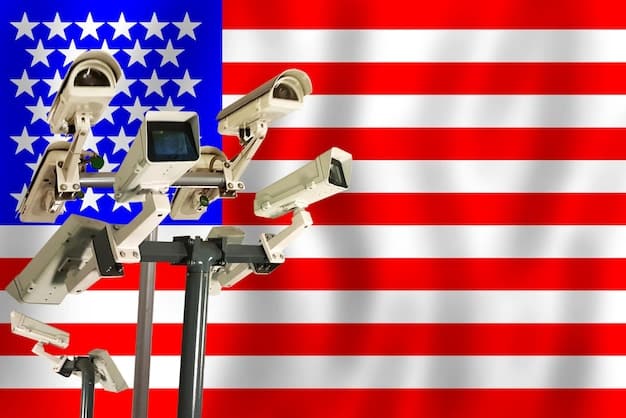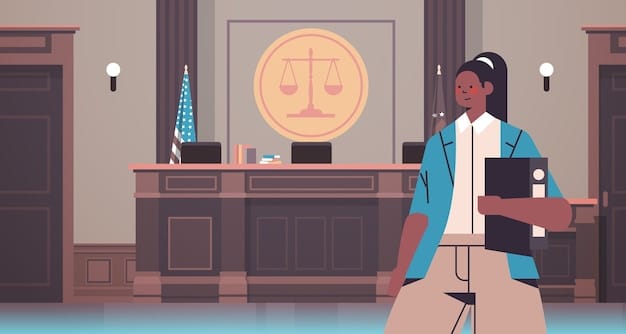How the Patriot Act of 2001 Still Impacts US Surveillance in 2025

The 2001 Patriot Act, enacted in response to the 9/11 attacks, dramatically expanded the U.S. government’s surveillance powers, and its effects continue to shape surveillance policies in 2025 through ongoing debates about privacy, civil liberties, and national security.
The landscape of surveillance in the United States is deeply intertwined with the legacy of the 2001 Patriot Act. Passed in the immediate aftermath of the September 11th attacks, this legislation dramatically expanded the government’s authority to conduct surveillance in the name of national security, and its influence continues to be felt in 2025.
The Genesis of the Patriot Act
To understand the Patriot Act’s lasting impact, it’s crucial to examine its origins. Enacted swiftly after 9/11, the Act was framed as an urgent measure to prevent future terrorist attacks. However, critics argued that it represented an overreach of government power, leading to significant erosion of civil liberties.
Key Provisions of the Original Act
Several provisions within the Patriot Act were particularly controversial, raising concerns about privacy and due process. Section 215, for example, allowed the government to collect business records, including library records, without demonstrating probable cause. This and other provisions became lightning rods for criticism.
The Rationale Behind the Legislation
Proponents of the Patriot Act argued that these expanded powers were necessary to connect the dots and prevent future attacks. They emphasized that the Act included safeguards to prevent abuse, such as judicial oversight. However, critics remained skeptical, pointing to the potential for misuse and the lack of transparency.
- Expanded surveillance authority significantly after 9/11.
- Enabled collection of business records without probable cause (Section 215).
- Arguments for necessity versus concerns about civil liberties.
The genesis of the Patriot Act was rooted in a moment of national crisis and fear. While intended to protect the country, it set the stage for ongoing debates about the balance between security and freedom.
Controversies and Criticisms Surrounding the Act
The Patriot Act has been met with substantial controversy since its inception. Critics have consistently raised concerns about its potential for abuse and its impact on fundamental rights. These criticisms have fueled legal challenges and public debate, contributing to the ongoing scrutiny of surveillance policies.

Privacy Concerns and Civil Liberties
One of the primary criticisms of the Patriot Act is its potential to infringe upon privacy rights. Provisions allowing for broad data collection and surveillance without warrants have raised alarms among civil liberties advocates. They argue that the Act creates a chilling effect, discouraging free speech and association.
Legal Challenges and Court Rulings
The Patriot Act has faced numerous legal challenges, with some provisions being struck down or modified by the courts. These legal battles have focused on issues such as the scope of surveillance authority and the lack of judicial oversight. The courts have played a crucial role in shaping the interpretation and application of the Act.
The controversies and criticisms surrounding the Patriot Act are central to understanding its legacy and its ongoing impact on surveillance policies. These debates reflect fundamental disagreements about the proper balance between security and liberty in a democratic society.
Amendments and Reauthorizations
Over the years, the Patriot Act has undergone several amendments and reauthorizations. These legislative actions have modified certain provisions, extended sunset clauses, and attempted to address some of the concerns raised by critics. Understanding these changes is crucial for assessing the Act’s current form and its future trajectory.
Sunset Clauses and Congressional Debates
Many provisions of the Patriot Act were initially subject to sunset clauses, meaning they would expire unless reauthorized by Congress. These sunset clauses sparked recurring debates about the necessity and scope of the Act’s powers. Congressional reauthorizations often involved compromises and modifications to address competing concerns.
The USA Freedom Act
In 2015, Congress passed the USA Freedom Act, which reformed some of the Patriot Act’s most controversial provisions. The Freedom Act ended the government’s bulk collection of phone records and imposed additional oversight requirements on surveillance activities. However, it also preserved many of the Act’s core powers.
- Sunset clauses led to recurring congressional debates.
- The USA Freedom Act reformed some provisions in 2015.
- Debates continue over the appropriate scope of surveillance powers.
The amendments and reauthorizations of the Patriot Act demonstrate the ongoing tension between the desire for security and the protection of civil liberties. These legislative actions reflect the evolving nature of the debate surrounding government surveillance.
The Patriot Act’s Influence on Surveillance Technologies
The Patriot Act has significantly influenced the development and deployment of surveillance technologies in the United States. By expanding the government’s authority to collect data and conduct surveillance, the Act has created incentives for the development of new tools and techniques for gathering information. This technological arms race has had profound implications for privacy and civil liberties.
Expansion of Data Collection Capabilities
The Patriot Act’s emphasis on data collection has spurred the development of technologies capable of processing and analyzing vast amounts of information. These technologies include advanced data mining tools, facial recognition software, and artificial intelligence algorithms. The government’s ability to collect and analyze data has grown exponentially since the Act’s passage.
Fusion Centers and Information Sharing
The Patriot Act has also promoted the creation of fusion centers, which are hubs for sharing information between federal, state, and local law enforcement agencies. These fusion centers facilitate the dissemination of intelligence and surveillance data, enhancing the government’s ability to identify and respond to potential threats. However, they have also raised concerns about the potential for overreach and the lack of transparency.
The Patriot Act’s influence on surveillance technologies is undeniable. By expanding the government’s authority and creating incentives for technological development, the Act has reshaped the landscape of surveillance in the United States.
The Debate Over Reauthorization in 2025
As certain provisions of the Patriot Act approach potential reauthorization in 2025, the debate over its merits and drawbacks is likely to intensify once again. This debate will involve lawmakers, civil liberties advocates, intelligence officials, and the public, each with their own perspectives on the proper balance between security and freedom.

Arguments for and Against Renewal
Proponents of reauthorization will likely argue that the Patriot Act remains a vital tool for protecting national security. They may point to ongoing threats from terrorism and cyberattacks, arguing that the Act’s powers are necessary to prevent future attacks. Opponents, on the other hand, will emphasize the potential for abuse and the need to protect civil liberties. They may call for reforms to address privacy concerns and enhance judicial oversight.
Potential Reforms and Modifications
The debate over reauthorization could lead to potential reforms and modifications to the Patriot Act. Lawmakers may seek to strengthen privacy protections, limit the scope of surveillance authority, or enhance transparency and accountability. The outcome of this debate will shape the future of surveillance policies in the United States.
The debate over reauthorization in 2025 represents a crucial moment for reassessing the Patriot Act’s legacy and its impact on surveillance policies. This debate will determine the future direction of government surveillance in the United States.
The Enduring Legacy and Future Implications
The Patriot Act’s enduring legacy lies in its transformation of the legal and technological landscape of surveillance in the United States. Its impact is still felt in 2025. While intended to enhance national security, the Act has raised fundamental questions about the balance between security and liberty in a democratic society.
The Evolving Surveillance State
The Patriot Act has contributed to the growth of what some have termed a “surveillance state,” characterized by pervasive data collection, advanced technological capabilities, and expanded government authority. This evolution has raised concerns about the potential for abuse and the erosion of individual privacy.
The Ongoing Debate
The Patriot Act has shown the enduring debate over surveillance policies is far from over. As technology continues to evolve and new threats emerge, policymakers and the public will need to grapple with the challenge of balancing security concerns with the protection of fundamental rights. The legacy of the Patriot Act will continue to shape this debate for years to come.
| Key Point | Brief Description |
|---|---|
| 📜 Origins | Enacted post-9/11 to enhance national security. |
| 🛡️ Controversies | Concerns over privacy infringements and civil liberties. |
| ⚖️ Amendments | USA Freedom Act reformed some provisions in 2015. |
| 📱 Tech Influence | Spurred development of data collection technologies. |
Frequently Asked Questions
▼
The Patriot Act was enacted in response to the 9/11 terrorist attacks to enhance national security by expanding surveillance capabilities and information sharing between government agencies.
▼
Key criticisms included concerns over its potential impact on civil liberties, privacy rights, the expansion of government surveillance powers, and the lack of judicial oversight.
▼
The USA Freedom Act of 2015 brought about reforms, such as ending bulk data collection of phone records, to address privacy concerns and improve oversight of surveillance activities.
▼
It spurred the development of advanced data collection and analysis technologies, including data mining tools and facial recognition software, and also spurred the creation of fusion centers.
▼
The future entails ongoing debates about security vs. privacy, with potential reauthorizations leading to reforms. The Patriot Act’s lasting impact is still felt in 2025 and the debate continues.
Conclusion
In conclusion, how the 2001 Patriot Act continues to shape surveillance policies in 2025 is a complex interplay of national security concerns and civil liberties. Its legacy continues to shape the legal and technological landscape of surveillance in the United States, prompting ongoing debates about the proper balance between security and freedom. Only time will tell what the future holds.





